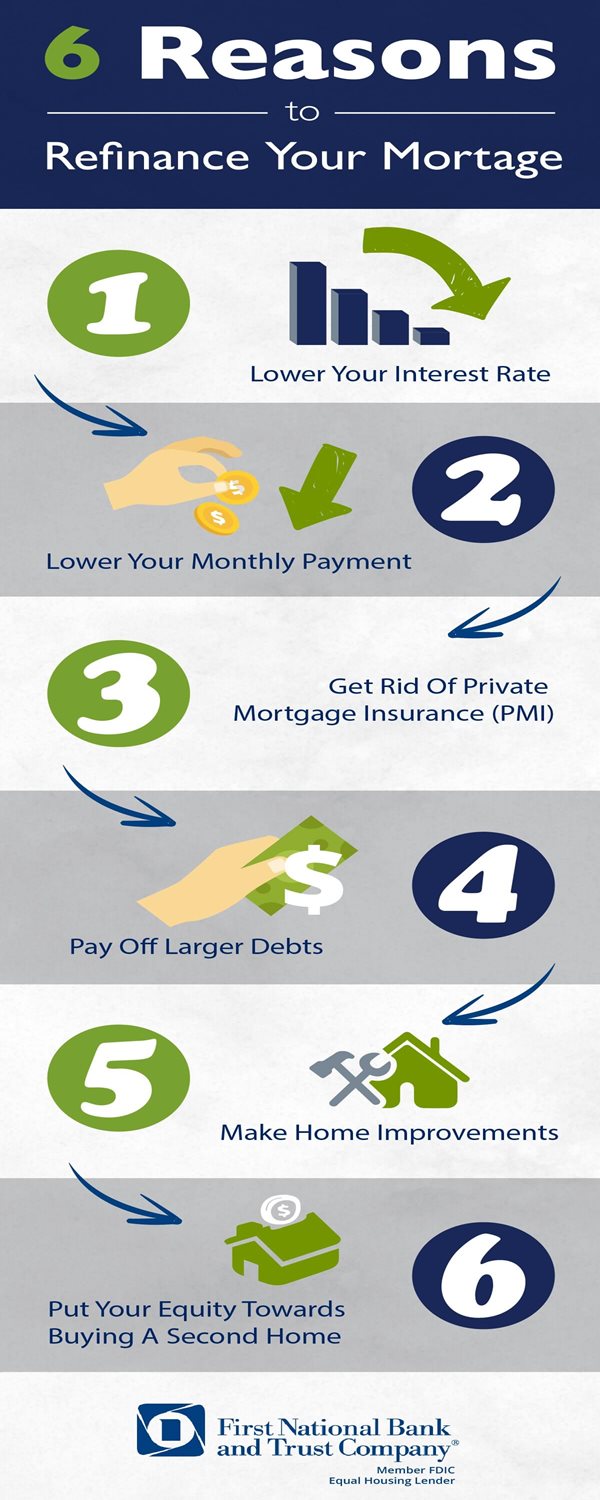Why You Should Refinance Your Home
Historically low interest rates — which hovered under 3% in the last week of 2021 — have lots of homeowners wondering if they should refinance their home. And in fact, home refinance became increasingly popular last year as more Americans elected to stay in their current homes rather than enter a highly competitive home buying market.

In the first half of 2021, there was a 33% increase in refinance activity compared to the first half of 2020. You may be asking yourself, “Should I refinance my home? And if I should, how do I refinance, and how much will it cost?” These are all smart questions to answer before you make your decision. Refinancing your home has several benefits — but it isn’t always a sure bet for every homeowner.
6 reasons for refinancing your home
First of all, let’s define what a home refinance is, exactly: Essentially, you’re trading in your old mortgage for a new one. Refinancing a home loan lets you change the terms of your loan, with the goal of giving yourself more favorable terms, such as a lower interest rate, a lower monthly payment, or a shorter lending term. You basically pay off your old mortgage with the new one, which is why it’s called refinancing.
Many people don’t think about refinancing when they
buy their homes, but here are six reasons you might want to consider refinancing your home loan.
- You can lower your interest rate. If you bought your house before mortgage rates dropped below 3%, you may be paying much more in interest than if you refinance your home loan. A lower interest rate means you’ll save more money each month, which you can elect to put toward debt or pad your savings account or nest egg.
- You may be able to lower the amount of your monthly payment. If you’re struggling to make the higher payments on your 15-year loan, refinancing to a 30-year loan can lower your monthly payments. Or perhaps you have an Adjustable Rate Mortgage, or ARM loan, where the rate rises as time goes on. Refinancing your home loan lets you switch to the relative safety of a fixed-rate mortgage.
- You may be able to get rid of private mortgage insurance, or PMI. New homeowners often must pay PMI because they’re unable to come up with 20% of their down payment, which can add hundreds of dollars each month to their monthly mortgage payment. Homeowners stop paying PMI once their home equity reaches that 20% — but that can take years. Consider refinancing instead.
The refinancing tactic works if your home has gained substantial value since the last time you got a mortgage. For example, if you bought your house four years ago with a 10% down payment, and the home’s value has risen 15% since then, you now owe less than 80% of what the home is worth. Under these circumstances, you might be able to refinance into a new loan without having to pay PMI.
- You can pay off larger debts, like medical expenses or student loans. If you’ve lived in your home for several years, and with home values rising as quickly as they have been, you’ve probably built up equity in your home. A cash-out refinance replaces your current loan with a higher-value loan and takes out a portion of the equity you have in cash, which you can use toward debt.
For example, if you have a $250,000 mortgage and $100,000 in equity, you still owe $150,000 on your loan. You may receive a new loan for $175,000 and your lender will give you the $25,000 difference in cash after closing. You can then use that money for anything you want — such as
paying off your debts.
But paying down debt isn’t your only option.
- You can use your equity to make home improvements. If you’ve got a big home remodeling project on your wish list but just haven’t saved the money, a home loan refinance could give you the money you need for that bathroom or kitchen remodel. Using the equity in your home can be better than taking out a personal loan or putting charges on a credit card because cash-out refinances usually have lower interest rates than most credit cards.
- You can put your equity toward buying a second home. Ever dreamed of owning a vacation home? Or having an investment property that you can rent out to generate more income? The home equity cash from refinancing your home loan can also be put toward these types of purchases.
Cost of refinancing your home
Refinancing your home loan isn’t free, so it's important to understand the costs associated with refinancing. These are considered closing costs, which can be about 2%-3% of your loan balance.
- Application fee: You pay this when you apply for your refinance, even if the lender rejects your refinance loan request.
- Appraisal fee: Most lenders require appraisals on your home before refinancing.
- Title search and insurance: Your lender may require another title search when you refinance your home loan.
- Attorney fees: Depending on your state, an attorney is required to review and file paperwork for your loan.

FNBT can help you refinance your home
Thinking that refinancing your home might be the right decision for you? Trust our mortgage experts at First National Bank and Trust to help you through refinancing and every stage of the
home loan process.
Talk with a member of our mortgage team or come into one of
our 16 locations throughout southern Wisconsin and northern Illinois.